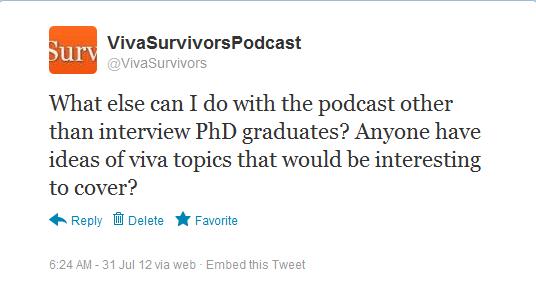My survey “UK PhD Viva Survivors (2000-2013)” has been running for a week now, and in that time with the very helpful assistance and generosity of people on Twitter and Facebook I have managed to get 138 responses! This is fantastic news, as it gives me hope that I can obtain enough data to produce something with statistical significance.
I’ve mentioned before that my first data collecting goal is to obtain 400 responses. This will provide a minimum in producing a picture of “the average viva” if such a thing could be said to exist. One problem with this minimal size is that when one considers subsets, say, of the arts and humanities and the STEM subjects, it may be that those subsets do not have enough respondents for the results to be meaningful. That’s why 400 responses is my bare minimum: and after that point I will take a first look at the data coming in, and see what the makeup is like. It may be that more targeted recruitment will allow for individual pictures of subjects or fields to be painted. If that goal of 400 responses is met, then I’ll take a look at the statistics again to see what the next goal might be, and what confidence one could have in those results.
(As an interesting side note, I’ve been amazed at how quickly I’ve got responses. After tweeting yesterday morning, someone sent out their own tweet about it, and this tweet was RTed over 20 times, which meant that I almost doubled my number of responses in under 24 hours. It’s these sorts of network effects that I am hoping will really produce great quantities of data for my analysis.)
Today is the 12th of March, and so we have good deal of time until the 30th of April, when I’ll end data collection. I won’t be resting on my laurels and just waiting for data to come in. When I get a chance my next targets/thoughts are to email and tweet some university alumni accounts, as well as keep tweeting and linking and hashtagging to get as many responses as possible. If you know someone who might be happy to answer seven quick questions about their viva, then please share tinyurl.com/VivaSurvivorsSurvey with them – or if you have the means to share the link more widely then please do so. You’ll be helping to create a picture of the PhD viva in the UK.
If you have any thoughts about what else I can do to share this survey – or interesting thoughts on questions to ask the data set when the responses are in, then please get in touch, either in the comments or by email.
Thanks for reading,
Nathan (you can email me here, or tweet at @DrRyder or @VivaSurvivors)
